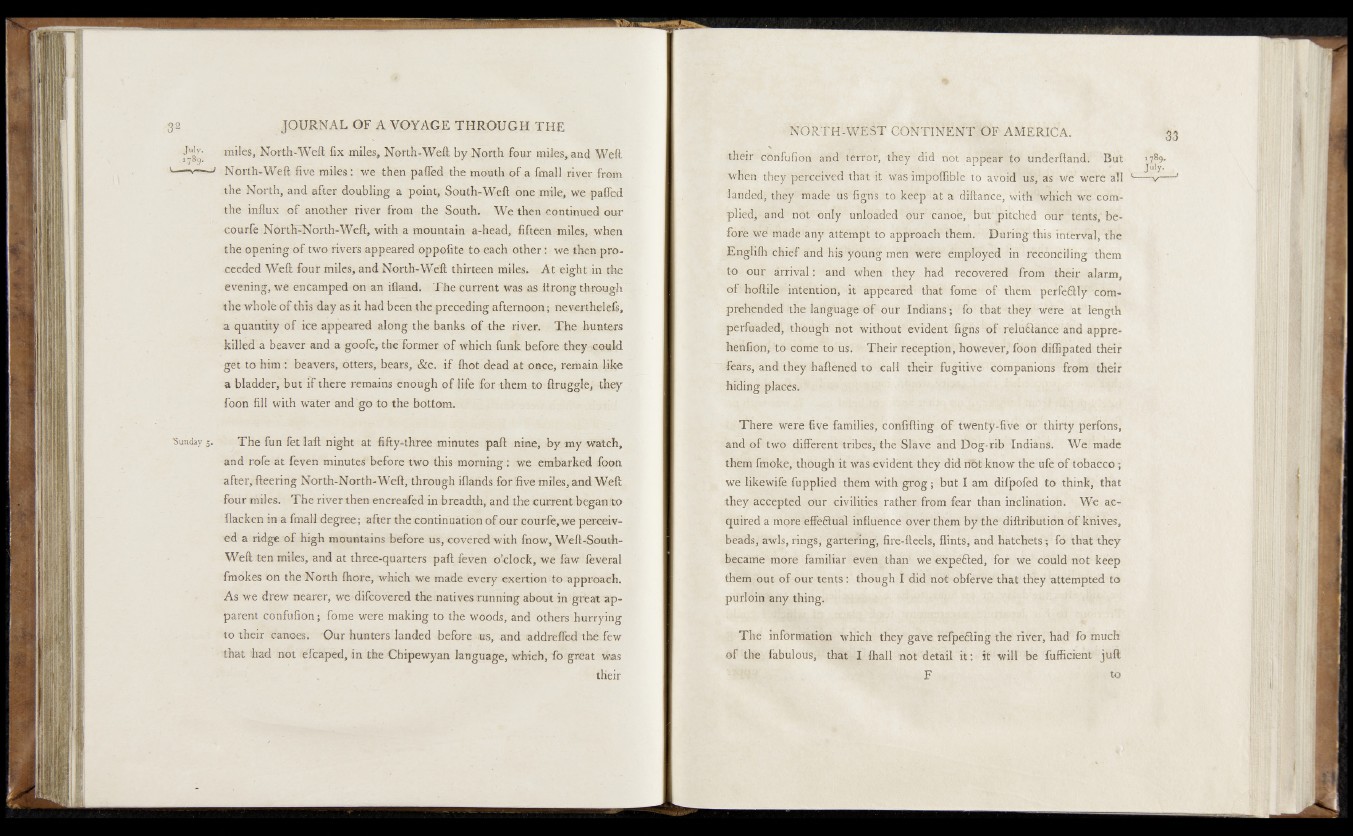
mile«, North-Weft fix miles* North-Weft by North four miles, and Weft
North-Weft five miles ; we then palled the mouth of a final 1 river from
the North, and after doubling a pointy South-Weft one mile, we palled
the influx o f another fiver from the South. We then eontmtae-d our
eourfe NoFtENorth-Weft, with a mountain a-head, fifteen-miles, when
the opening o f two livers appeared ©p polite to each Other: we then proceeded
Weft four miles, and North-Wefft thirteen miles. At eight :in the
evening, we esrfe&mped on an iflaastd. The current was as ftrong through
the whole of this day as it had been the preceding afternoon; neyert-holeft,
a quantity of ice appeared along the hanks of the river. The hunters
killed a beaver and a goofe, thefor-mer o f which funk before fhey-iooukl
get to ferai: beavers, otters, bears, &c. if fhot dead at Dace, remain like
a bladder, but if there remains enough ,©f life for them to ftruggle, they
foon fill with water and go to the bottom.
Sunday 5. *5 The fun fet laft night at fifty-three minutes paft nine, by my watch,
and rofe at ffeven minutes"before two this morning: we embarked foon
after, fteering North-North-Weft, through iflands. for 'five miles, and Weft
four miles. The riveriben enereafed in breadth, and the current beganitio
Hackee in a final! degree ; after the .•continuation of our caurfe/we perceived
a ridge o f high mountains before us, covered with ftiow, Weft-Soufrh-
Weft ten miles, and at three-quarters paft ieven o’clock, we law fevecal
ftnokes Oft the North Ihore, which we made ievery exertion to approach.
As%e drew nearer, wedifcbvered t fc natives winning about m .great apparent
confufion; fome were making to the woods,-and others hurrying
to their canoes. 'Qur tenters landed before .ns, and addrefedthe. few
'fout ted not eTeaped, in the Ghipewyan language, which, fognCat was
their
their''Ctirifijfion- ând‘ féAbr, they did nbt appfl&f'to underftand. But
twbenJ foey-fperedved that it w*is ihijpoffible'to avbfu-ifs', a‘s we' were all
landed^ the/'made iis fighsto ketp^àt a dfftance; With°which weetffn-
fdièdf and nbt: only '" udfoaded * t e f ficado&^bw1 oifclted On? tents," before
we’ iriadtbany attempt to appfbaelf'lhetn. Darmg^fbis mtefyal, the
Eflglilh chief and his'ÿàüng mefi- were employed in reconciling them
tovoUf; arrival : and-when they had recovered^ from their alarm,
of* hoftileintentfotfj it àpftëaÿfd- that fome "fof thfem1 pelfëS^’eom-
prehfended' the language'dftOur 'Indians'; 'fo ‘ Éhat-they‘were Ja t ’length
perfaaded, though not without"'evident figns o f rëluélarrce and appre-
heîifiôn,' !to come to us. ‘•-Their reception, however,1 foon diffipated thèir
feats, and they haftened to call their fugitive companions from their
hiding placés. ?
There were five families,-1 confifting of twenty-five or thirty perfora,
and of two different tribes^theîSTavè and Dog-fib Indians. We. made
them finoke, though it wasdvidènt they did rf&t know the ufe of tobacco |
we likewife fupplied them with grog ; but I am dilpofed to thinks that
.they accepted our civilities rattedfrom fear than inclination. We acquired
a more ëffeftuàl influence over them by the diftributidn of knives,
beads,' awls, rings, gar tenng, fire-fteéls, flints, and hatchets'-, fo that they
becatrie more familiar evën. than we expefted, for we could not-keep
them, out of our tents : thOUgh I did not- obferve! that fifty attempted to
purloin any thing. ty
: . The information which they gave refpeéling the niter; had" fo much
of1 the- fabulousfithat I fhall not detail I ;| i t ' will be fufficifenbLjuft
i i É to